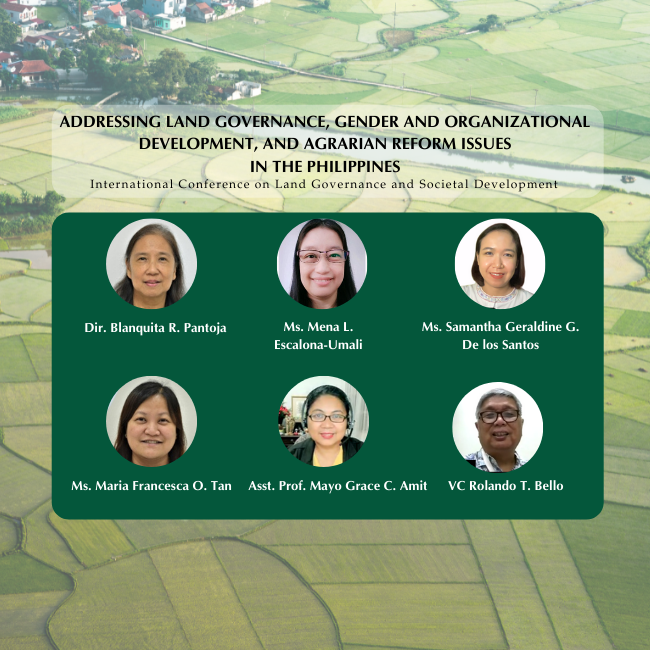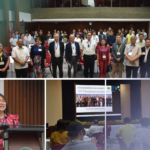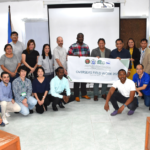Researchers and faculty of the UPLB College of Public Affairs and Development (CPAf) talked about land governance, gender and organizational development, and agrarian reform issues in the Philippines during the International Conference on Land Governance and Societal Development. Held on Dec. 8-10, the online event was organized by Hanns Seidel Foundation in partnership with Namibia University of Science and Technology (NUST), Africa.
The CPAf-organized parallel session started with an introduction of the Comprehensive Agrarian Reform Program (CARP) of the Philippines. In her paper presentation co-authored by Joanne V. Alvarez, Dir. Blanquita R. Pantoja of the Community Innovations Studies Center (CISC) discussed the three major components of CARP. These include Land Tenure Improvement (LTI), Program Beneficiaries Development (PBD), and Agrarian Justice.
Dir. Pantoja stressed the need to adopt a land consolidation model to extend support services to agrarian reform beneficiaries (ARBs) and other farmers. She also emphasized that investors must be enticed to provide for the needs of farmers. “Financial assistance is one critical need of our farmers [as] most of them belong to the marginalized sector of the country,” she mentioned.
The second paper, written by Mena L. Escalona-Umali and Johnnelda P. Cosep, provided an overview and analysis of LTI in the Philippines’ agrarian reform areas. Escalona-Umali discussed the history of agrarian reform and various LTI services. With the discrepancies in targets versus accomplishments data, she pointed out the need for a reliable database system to facilitate monitoring and evaluation of ARBs data and landholdings.
The third paper presentation posed this question: “Where do women stand in agriculture production?” Samantha Geraldine G. De los Santos discussed the roles and involvement of women in agricultural production. In her conclusion, she said that women, generally are empowered in terms of access to education; but economic opportunities are mostly non-agricultural in nature. Her paper was co-authored by Dir. Pantoja and Florita P. Rañeses.
The next presentation featured two agrarian reform beneficiaries organizations (ARBOs) involved in sugarcane block farming (SBF). From the SWOT (strengths, weaknesses, opportunities, and threats) analysis and maturity assessment conducted, Maria Francesca O. Tan shared that both ARBOs need business development interventions. Thus, she proposed conducting training activities on operations management and organizational administration. The paper was co-written by Dir. Pantoja and De los Santos.
Finally, Asst. Prof. Mayo Grace C. Amit noted the need to push for more reforms and greater efficiency in land management coordination on the ground. Her paper was co-written by David John F. Rodriguez.
UPLB Vice Chancellor Rolando T. Bello, one of the session discussants, highlighted the need to examine the best practices of the neighboring countries. Another discussant, Adriann M. Quilloy of the UPLB College of Economics and Management noted the relevance of the paper on gender and development (GAD) in mainstreaming GAD in cooperatives. She also acknowledged the methods used in the SBF study that uncovered the capacities and needs of the ARBOs.
NUST lecturer and session chair, Jennilee Kohima, mentioned that while in the Philippines, land consolidation has driven acceleration for economies of scale (production efficiency), it is interesting to note that in Namibia, land subdivision is being implemented.
Agrarian reform is one of the research thrusts of CPAf. The College also offers a degree in Master in Public Affairs major in Agrarian and Rurban Development Studies and undergraduate courses in agrarian studies.
Author profile
Johnnelda P. Cosep
Related entries
-
Johnnelda P. Cosep#molongui-disabled-link
-
Johnnelda P. Cosep#molongui-disabled-link17 November 2022
-
Johnnelda P. Cosep#molongui-disabled-link18 February 2022





